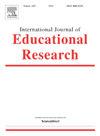Unraveling the dynamics of teacher-student relationships, emotions, and socioeconomic status in shaping subjective well-being among FL learners
IF 2.5
3区 教育学
Q1 EDUCATION & EDUCATIONAL RESEARCH
引用次数: 0
Abstract
The direct association between teacher-student relationships and subjective well-being among foreign language (FL) learners has been validated. Nevertheless, the indirect pathways through which teacher-student relationships impact the subjective well-being of FL learners remain less understood. Drawing from control-value theory, this research examined the mediating role of emotions such as enjoyment and boredom in this relationship, and further investigated how socioeconomic status (SES) influences these mediating effects, guided by social capital theory. A total of 4,004 Chinese secondary school students from grades 7 to 9 (Mage = 13.47, SD = 0.62) participated in this study. Data were collected using self-reported questionnaires on teacher-student relationships, FL enjoyment, FL boredom, and subjective well-being. Mediation analysis revealed that the link between teacher-student relationships and subjective well-being was partially mediated via enjoyment and boredom in FL learning. Additionally, compared to low SES learners, the effect of teacher-student relationships on reducing boredom and thereby improving subjective well-being was more pronounced among high SES learners. These findings offer practical insights for enhancing FL teaching and learning, as well as for refining FL teacher education programs.
揭示师生关系、情感和社会经济地位在塑造外语学习者主观幸福感中的动态作用
师生关系与外语(FL)学习者主观幸福感之间的直接联系已经得到验证。然而,人们对师生关系影响外语学习者主观幸福感的间接途径仍然知之甚少。在社会资本理论的指导下,本研究借鉴控制价值理论,考察了愉快和无聊等情绪在这种关系中的中介作用,并进一步研究了社会经济地位(SES)如何影响这些中介效应。共有 4,004 名七至九年级的中国中学生(年龄 = 13.47,标准差 = 0.62)参与了本研究。研究使用自我报告问卷收集数据,内容包括师生关系、FL 乐趣、FL 厌烦和主观幸福感。中介分析表明,师生关系与主观幸福感之间的联系部分是通过FL学习中的乐趣和厌倦来中介的。此外,与社会经济地位低的学习者相比,高社会经济地位的学习者在师生关系对减少无聊从而提高主观幸福感方面的作用更为明显。这些发现为提高FL教学和学习效果,以及完善FL教师教育项目提供了实用的启示。
本文章由计算机程序翻译,如有差异,请以英文原文为准。
求助全文
约1分钟内获得全文
求助全文
来源期刊

International Journal of Educational Research
EDUCATION & EDUCATIONAL RESEARCH-
CiteScore
6.20
自引率
3.10%
发文量
141
审稿时长
21 days
期刊介绍:
The International Journal of Educational Research publishes regular papers and special issues on specific topics of interest to international audiences of educational researchers. Examples of recent Special Issues published in the journal illustrate the breadth of topics that have be included in the journal: Students Perspectives on Learning Environments, Social, Motivational and Emotional Aspects of Learning Disabilities, Epistemological Beliefs and Domain, Analyzing Mathematics Classroom Cultures and Practices, and Music Education: A site for collaborative creativity.
 求助内容:
求助内容: 应助结果提醒方式:
应助结果提醒方式:


